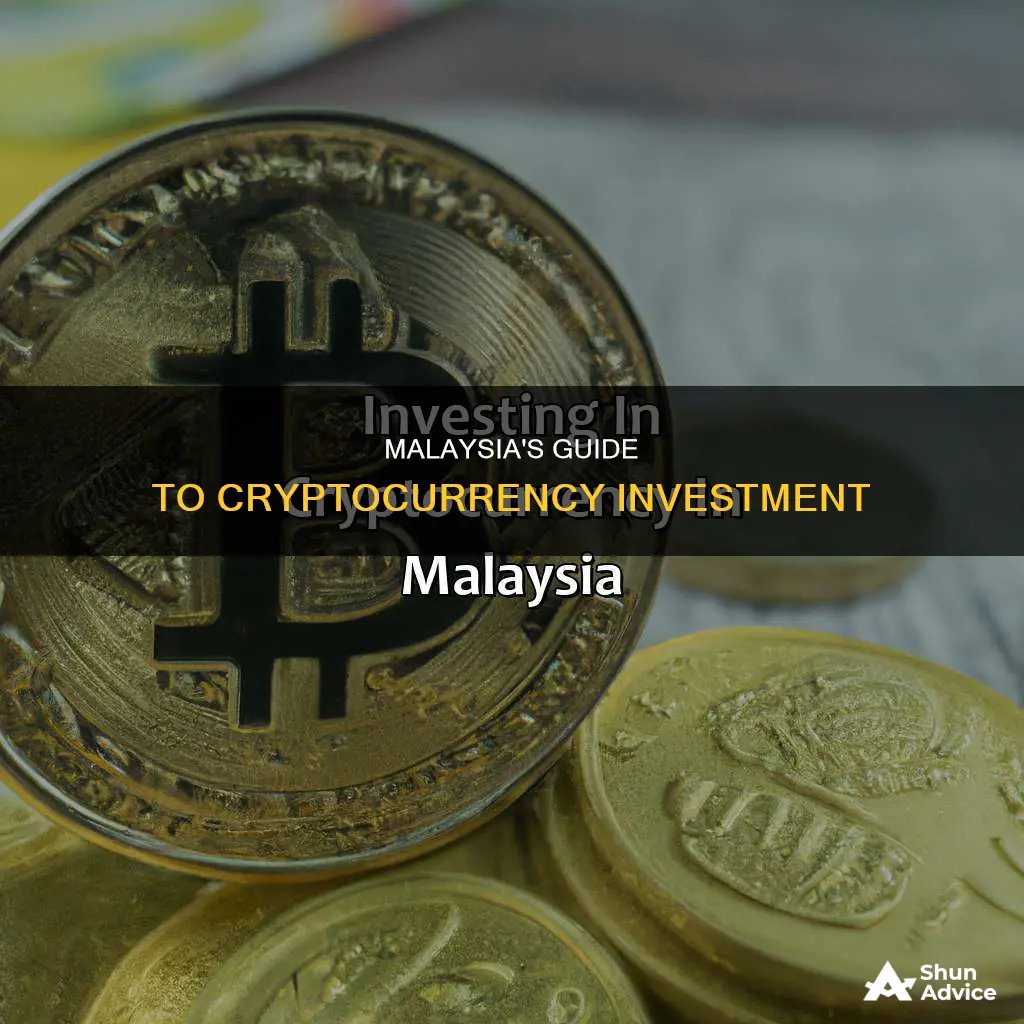
Investing in cryptocurrency in Malaysia has become increasingly popular, but it's important to understand the risks and legal considerations involved. Cryptocurrency is a digital asset that uses cryptography to secure transactions and exists outside the control of governments and central authorities. While it is not illegal to invest in cryptocurrency in Malaysia, it is also not recognised as legal tender, so investors need to be cautious. The most popular way to buy cryptocurrency is through a licensed exchange, and there are currently four approved exchanges in Malaysia: Luno, SINEGY, Tokenize and MX Global. These exchanges offer an easy way to buy and sell cryptocurrencies with low fees and simple interfaces, but it's important to do your research and understand the risks before investing.
| Characteristics | Values |
|---|---|
| Cryptocurrency status in Malaysia | Not a legal tender but not illegal either |
| Number of approved cryptocurrencies in Malaysia | 13 |
| Number of approved exchanges in Malaysia | 4 |
| Examples of approved exchanges | Luno, SINEGY, Tokenize, MX Global |
| Cryptocurrencies offered by approved exchanges | Bitcoin, Ethereum, Litecoin, Ripple, Bitcoin Cash, Uniswap, Chainlink, Cardano, Solana, Avalanche, Polygon, Polkadot, Cosmos |
| Ways to buy cryptocurrency in Malaysia | Licensed Cryptocurrency Exchanges, Peer-to-Peer Marketplace, Bitcoin ATMs |
What You'll Learn

How to choose a cryptocurrency exchange platform
When choosing a cryptocurrency exchange platform in Malaysia, there are several factors to consider. Firstly, it is important to ensure that the platform is compliant with regulations set by the Securities Commission Malaysia (SCM). All exchanges in Malaysia must be licensed and comply with the SCM's guidelines, which include standards for security and investor protection. This helps ensure that your funds are protected even if the platform encounters issues.
Secondly, consider the range of cryptocurrencies offered by the platform. If you are a beginner, you may prefer a platform with a smaller, curated list of popular cryptocurrencies like Bitcoin, Ethereum, and Litecoin. More experienced traders may prefer a platform with a wider range of altcoins and meme coins to choose from.
Thirdly, evaluate the fees charged by the platform. Different platforms have different fee structures, with some charging maker and taker fees, while others charge a flat trading fee. Some platforms may also have deposit and withdrawal fees, especially when using credit or debit cards. It is important to understand these fees to avoid unnecessary costs.
Next, consider the payment methods accepted by the platform. Most platforms accept bank transfers, while some also support credit and debit cards, and even mobile payment options like Google Pay and Apple Pay. Choose a platform that supports your preferred payment method.
Additionally, it is essential to prioritize security when choosing an exchange platform. Look for platforms that offer advanced security measures such as multi-factor authentication, cryptography-verified audits, and cold wallet storage solutions. These features help protect your assets from unauthorized access and potential hackers.
Finally, consider the user experience and customer support provided by the platform. Choose a platform with a user-friendly interface that is easy to navigate, especially if you are a beginner. Also, look for platforms with responsive customer support to assist you promptly if any issues arise.
Some popular cryptocurrency exchange platforms in Malaysia include Luno, Binance, and Tokenize. Luno is a leading Malaysian exchange with a user-friendly platform and strong regulatory compliance. Binance, the world's largest exchange by user base, offers a wide range of cryptocurrencies and deep liquidity. Tokenize, founded by a Malaysian, offers a mobile app, a referral system, and robust security measures.
The Ultimate Guide to Cryptocurrency Coin Price Investing
You may want to see also

The risks of investing in cryptocurrency
Investing in cryptocurrency is a risky business, and it's important to understand the potential dangers before getting started. Here are some of the key risks to be aware of:
Volatility
Cryptocurrencies are highly volatile, and their prices can fluctuate sharply and suddenly. This volatility is driven by market sentiment, speculation, and manipulation. It can be challenging for investors to build confidence and secure gains due to the unpredictable nature of the market.
Unregulated Market
The anonymous and unregulated nature of the digital asset market contributes to price volatility. Crypto exchanges, media owners, and influential investors can potentially manipulate prices. The lack of regulatory frameworks also creates uncertainty regarding tax obligations and record-keeping requirements, deterring some investors.
Security and Custody
The security of cryptocurrencies is a significant concern. There is a constant threat of hacking, and theft of personal wallets and exchanges has occurred. Additionally, investors cannot recover lost or stolen assets, and mistaken transactions cannot be reversed. Cryptocurrencies also lack official safeguards or insurance, further increasing the risk.
Technical and Human Errors
Technical glitches and human errors are inevitable, and there is no foolproof method to prevent them. These errors can have significant financial implications for investors.
Peer-to-Peer Transactions
Digital currencies can be traded on various online platforms, but many marketplaces provide little to no clearing or intermediary services. In such cases, all risks, such as double-selling, lie solely with the transacting parties.
Loss of Private Key
Bitcoins and other cryptocurrencies are typically stored in a digital wallet controlled by both a public and private key. If the private key is lost, destroyed, or compromised, the investor may lose access to their digital assets. If acquired by a third party, they may gain unauthorized access to the investor's funds.
Potcoin Investment: A Beginner's Guide to Getting Started
You may want to see also

How to buy and sell cryptocurrency
Cryptocurrency is a digital asset that uses cryptography to secure transactions. It is not a legal tender in Malaysia, but it is also not illegal to invest in it. The Malaysian government has no intention to ban its citizens from buying or selling cryptocurrency.
There are a few ways to buy and sell cryptocurrency in Malaysia. The legal way to do so is through a licensed Digital Asset Exchange (DAX). As of 2019, Malaysia's Security Commission (SC) has approved four cryptocurrency exchanges: Luno, SINEGY, Tokenize, and MX Global. Opening an account with any of these platforms is easy. Simply go to their website or app, complete the verification process, transfer your funds, and buy any of the cryptocurrencies offered.
Another way to buy and sell cryptocurrency in Malaysia is through a peer-to-peer marketplace (P2P). Instead of going through an exchange platform, you can sell it directly to another individual. Sellers will post what they have for sale, how much they want for it, and acceptable payment methods.
- Compare and sign up with the best cryptocurrency exchange that suits your needs, such as low fees, ease of use, or 24-hour customer support.
- Verify your email address and identity by providing photo IDs and your phone number.
- Make an RM deposit using any payment method such as bank transfers, credit cards, or debit cards.
- Exchange your money for cryptocurrency by entering the amount you want to purchase and clicking "buy."
To sell cryptocurrency, follow these steps:
- Log into your account on an exchange platform.
- Click on the "Wallets" tab.
- If you already have cryptocurrency on the platform, proceed to sell it directly. If not, deposit your cryptocurrency from your private wallet to your exchange wallet.
- Click on the "Sell" button on the cryptocurrency/MYR pair.
- Enter the amount of cryptocurrency you want to sell.
- Review the transaction details.
- Once the transaction is processed, withdraw the MYR to your bank account.
It is important to note that purchasing cryptocurrency through any platform incurs fees, and it is recommended to do your research before investing in cryptocurrency due to its volatile and high-risk nature.
Dogecoin Investing: A Beginner's Guide to Getting Started
You may want to see also

The legal status of cryptocurrency in Malaysia
Cryptocurrency exchanges are legal in Malaysia but must register with the Malaysian Securities Commission (SCM) to operate. The SCM has outlined criteria for registration, including demonstrating the fitness of senior management employees and their ability to manage AML/CFT risks. Once registered, exchanges must abide by AML/CFT obligations, including customer due diligence and reporting suspicious transactions.
The Malaysian authorities generally consider cryptocurrencies to be securities, so tokens are regulated under securities laws overseen by the SCM under the Capital Markets and Services Act 2007. The SCM's revised guidelines on digital assets came into effect on October 28, 2020, allowing companies to raise funds through token offerings but requiring compliance with AML and anti-terrorism funding policies.
While the Malaysian government has indicated that cryptocurrencies are unlikely to be accepted as legal tender, there are suggestions that a more flexible regulatory approach may be adopted in the future. The government is also exploring the potential of a central bank digital currency (CBDC).
Royal Mint Coins: Worthy Investment or Costly Mistake?
You may want to see also

The different types of cryptocurrency wallets
There are several types of cryptocurrency wallets, each with its own features and security levels. The main types are custodial and non-custodial wallets, but there are also hot and cold wallets, as well as software, hardware, and paper wallets.
Custodial vs Non-Custodial Wallets
Custodial wallets require users to safeguard their private keys, while non-custodial wallets (also known as self-custody wallets) entrust security to a third party, usually a crypto exchange. Non-custodial wallets are considered more secure as they give users full control over their private keys and cryptocurrencies.
Hot vs Cold Wallets
Hot wallets are connected to the internet and are therefore more vulnerable to hacking. They are, however, more user-friendly and convenient for daily transactions. Cold wallets function primarily offline and are considered highly secure and virtually impervious to hacking. They are better suited for experienced users or those with large amounts of assets.
Software Wallets
Software wallets are applications that can be downloaded on desktop or mobile devices. They are usually free and easy to use, but they are potentially vulnerable to malware or computer viruses. Examples include Exodus, Electrum, and Mycelium.
Hardware Wallets
Hardware wallets are physical devices that resemble USB thumb drives. They are considered highly secure as they store private keys offline. They are priced between $30 and $200 and can be challenging for beginners to use. Examples include Ledger Nano S, Trezor, and KeepKey.
Paper Wallets
Paper wallets are physical pieces of paper that contain the data needed to access the cryptocurrency. They offer complete offline security but are easily lost or stolen. They also present limitations in sending partial funds and are time-consuming for transactions.
Best Bitcoin ETFs: Where to Invest Your Money
You may want to see also
Frequently asked questions
Yes, selected cryptocurrencies are legal in Malaysia. Crypto is not a legally recognised payment method, but it is also not illegal to own or trade.
The legal way to buy crypto in Malaysia is through a licensed Digital Asset Exchange (DAX). There are currently four approved exchanges: Luno, SINEGY, Tokenize and MX Global.
First, register and complete the verification process. Then, transfer funds into your account. Finally, buy any of the cryptocurrencies offered.
Cryptocurrency is a high-risk and volatile asset class. The value of crypto can fluctuate rapidly and there is a risk of theft or hacking. It is important to do your research and only invest what you can afford to lose.
Bitcoin is the most popular crypto in Malaysia and worldwide. Other popular options include Ethereum, Ripple, Litecoin, and Cardano.







